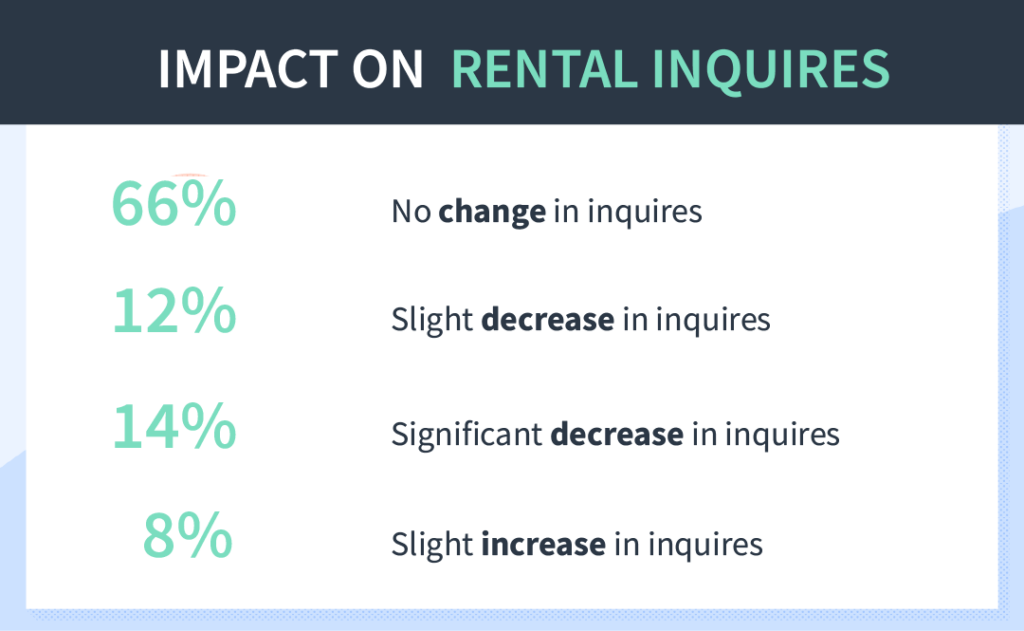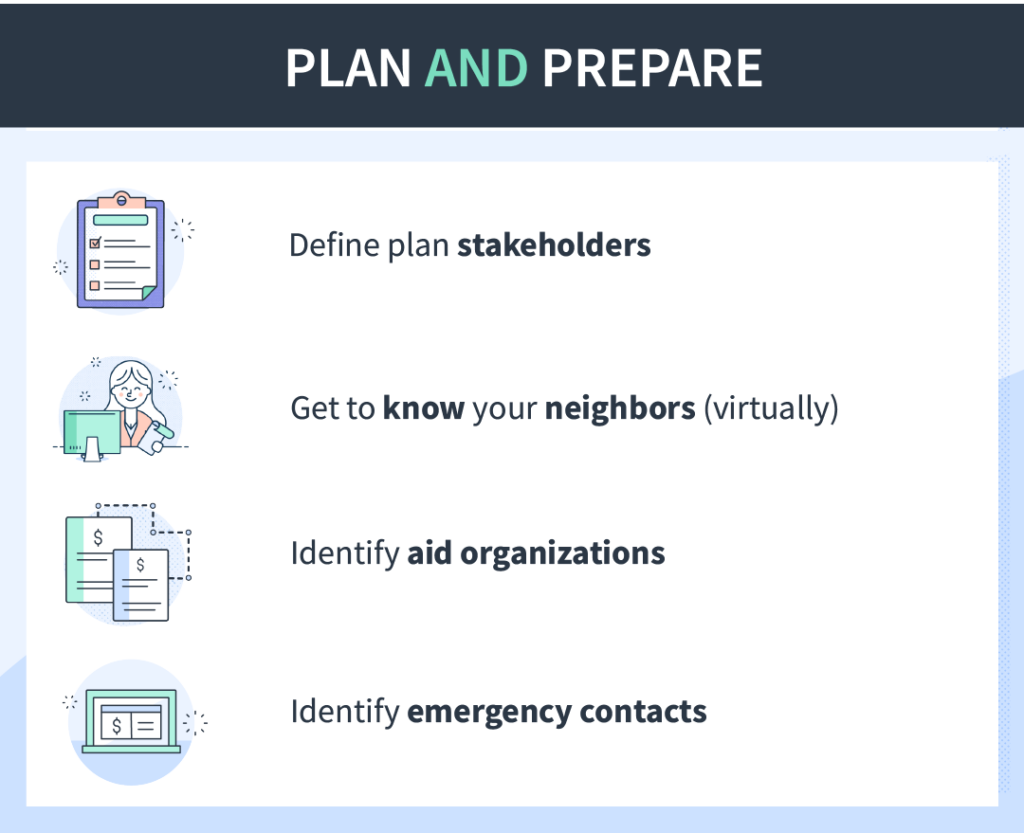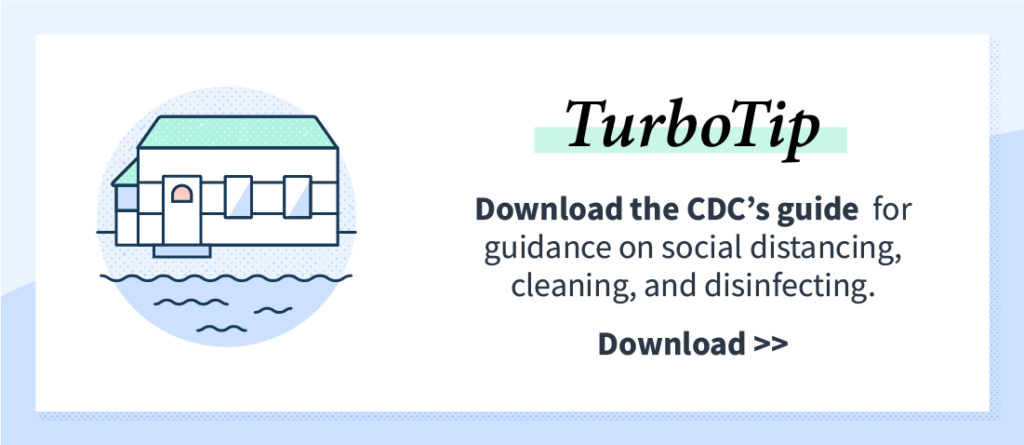How to Plan, Prepare and Respond
We may not know what the outcome of the coronavirus (COVID-19) pandemic will be, these times of uncertainty can bring anxiety and added stress. In an effort to help alleviate some of that stress, we’ve curated a list of resources and tips to help navigate this unprecedented time.
We also reached out to TurboTenant landlords to see what impacts they have seen so far, and how they are dealing with the effects of the coronavirus (COVID-19) outbreak. The news was enlightening, 66% of TurboTenant landlords reported no change in the number of rental inquiries and applications they have received. Twelve percent reported a slight decrease, and 14% reported a significant decrease, and 8% have seen a slight increase. As more social distancing and restrictions on contact are recommended, we will continue to report on the numbers in an effort to better understand how the pandemic is affecting the rental market. Read our most recent Rental Market Report here.

We also asked our landlords what information would be most helpful at this time. They overwhelmingly asked for best practices on educating and communicating with tenants and employees, as well as how to handle an outbreak at one of their units. Whether you have a single family unit, or a multifamily unit, tenants need to be aware of what they can do to help stop the spread, as well as what the landlord will be doing to help. The Centers for Disease Control (CDC) has put together resources and protocols on how to plan, prepare and respond to an outbreak. Below we will highlight key steps to think about at each stage as well as links to helpful information.
Plan and Prepare
One of the most important things to do during uncertain and unpredictable times, whether it be a pandemic or a natural disaster, is to keep the lines of communication open and fluid. Establish the best way to communicate with your tenant(s), it could be email, text, phone, etc., and push information proactively. Let your tenants know what you are doing to help stop the spread as well as what they can do to help stop the spread. The CDC recommends putting together a household plan of action. The tips below can provide some framework on high-level topics to discuss with your tenants, as well as guidance on creating a plan within their family, as well as yours.
- Define Plan Stakeholders – Establish a main point of contact and the best channel to communicate – email, text, a phone call, etc. Both the tenant and the landlord need to know who to notify if there is an outbreak, as well as the specific needs of each person.
- Get to Know Your Neighbors (virtually) – Reach out to your neighbors and let them know what steps you are taking to help combat the spread. Many neighborhoods have social media pages, including things like Facebook Groups and Nextdoor communities, consider joining if the information is relevant and up to date.
- Identify Aid Organizations – Put a list together of healthcare services, support and resources in your community. Distribute this to all stakeholders.
- Emergency Contacts – Make sure you have emergency contact information for your tenants, and provide the same information for them. Both parties need to have a clear emergency escalation path established should an outbreak or other related event occur.

Respond - What To Do in the Event of an Outbreak
The CDC has put together guidelines on what to do if someone becomes sick. We will highlight what steps they recommend following.
- Stay Home – It is advised people who are ill with COVID-19 stay home and contact their medical provider before seeking care. They are also advised not to leave the house except to get medical care.
- Home Isolation – Isolate the ill from the well. Designate a “sick room” and try to keep the ill person away from other family members as well as pets.
- Wear a Facemask – The sick individual should wear a facemask when around other people and when going to the doctor.
- Cover Your Mouth – Cover your mouth and nose with a tissue when you sneeze or cough. Promptly throw the tissue away. Washing for at least 20 seconds is recommended after coughing and sneezing.
- Wash Your Hands – Everyone is advised to wash their hands for at least 20 seconds and avoid touching their face, mouth and eyes.
- Clean Often – Clean all high-touch common areas daily and also clean all high-touch surfaces in the “sick room” daily.

For tips and guidance on cleaning and disinfecting, visit the CDC’s website. The Centers for Disease Control (CDC) is also updating its website and social media sites regularly in an effort to inform and educate the public on proper precautions and mitigation steps. You can find testing site locations, cleaning and disinfection recommendations, and the latest news through its outlets.
Other Things to Consider
Potential Lapses in Rent
HUD has also announced that it will be suspending all foreclosures and evictions for 60 days on certain mortgages. Many municipalities are passing laws to help tenants affected by the COVID-19 pandemic. San Jose and San Francisco were two of the first cities to advance legislation putting a moratorium on evictions and offering rent payment relief for workers affected by COVID-19 related work closures. New legislation is being proposed and passed quickly to help offset the financial implications of the COVID-19 pandemic, as more updates become available we will continue to inform our community of landlords.
Understanding Liability and Obligations
Laws and legislation is changing rapidly. As always, it is important for landlords to follow all guidelines and regulations set forth in the Fair Housing Act and understand how disability protections will apply to COVID-19. HUD has a Q and A on their site related to the Fair Housing Act and the COVID-19 outbreak that is updated daily. It covers some of the most frequently asked questions and can serve as a great reference point.
The National Multifamily Housing Council has also put together guidelines and guidance on how to navigate an outbreak.The full post, as well as a downloadable guide, is available here.
More Tips From our TurboTenant Landlords on How to Effectively Work Through a Pandemic
- Practice remote communication – have tenants communicate to you if they are sick so others around or in the same property can be notified.
- Place communal hand sanitizer in shared public spaces around the complex and disinfect properties after move-outs.
- Send out a letter or email advising tenants on best practices and precautions with helpful resources to the CDC and state healthcare sites.
- As social distancing is recommended, use online sources to market, screen, communicate, e-sign, and manage renters.
- Put all regular maintenance on hold unless there is an emergency.
- Collect rent payments online and avoid handling cash.
- Be flexible with rent due dates – possibly consider waiving late fees or extending rent time.
- If a tenant becomes quarantined, consider pausing rent until they get back on their feet again.
- Make sure you are staying up-to-date and following local laws or emergency declarations that pertain to rentals.
- Landlords cannot legally enforce anything about personal hygiene, but should still encourage sanitization and safe practices to tenants.
- Make sure communication with tenants is frequent (let tenants express concern and take the concern seriously/do what you can to ease those concerns).
TurboTenant is working hard to produce helpful content and resources for landlords and tenants during these unprecedented times. If there is a topic that you would like covered, please email us at [email protected].







